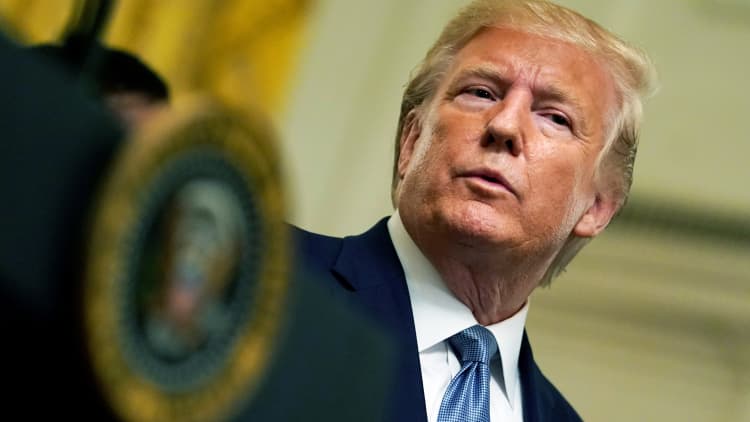President Donald Trump will ask the Supreme Court to halt a lawsuit against him brought by Maryland and Washington, D.C., alleging that he has violated the Constitution's emoluments clauses, his personal attorney said Thursday.
The 4th U.S. Circuit Court of Appeals ruled earlier in the day that the suit against the president over his Washington hotel property could proceed. The vote of the deeply divided appeals court was 9-6.
"We disagree with the decision of the Fourth Circuit," Trump's attorney Jay Sekulow said in a statement. "This case is another example of Presidential harassment."
Maryland and D.C. argue that Trump has unlawfully received payments from foreign and domestic governments that have done business with the Trump International Hotel, a high-end property located near the White House.
The Constitution bars presidents from receiving emoluments, an archaic word for types of payments, from foreign governments or U.S. states. Trump's attorneys have argued that the obscure constitutional provisions at issue do not apply to commercial transactions like booking hotel stays.
A three-judge panel of the Richmond-based 4th Circuit threw out the case in July, but Thursday's decision by the full court revived the suit.
Judge Diana Motz, who wrote the majority opinion, said she found it "puzzling" that the president argued that the case would subject him to intrusive discovery.
"The President has not explained, nor do we see, how requests pertaining to spending at a private restaurant and hotel threaten any Executive Branch prerogative," she wrote.
Split decisions
In both decisions, judges ruled along partisan lines, with Democratic appointees siding with Maryland and D.C. and Republican appointees siding with Trump.
In a partial exception, Chief Judge Roger Gregory, who sided with the majority of the full court, was first named to the bench by Democrat Bill Clinton as a recess appointment but was reappointed by Republican George W. Bush.
Trump has withstood a similar emoluments suit, brought against him by congressional Democrats, on technical grounds. In February, the federal appeals court in D.C. threw out the suit on the grounds that individual lawmakers can't represent Congress in cases against the president.
A third emoluments case against the president, brought by the good government group Citizens for Responsibility and Ethics in Washington and others, was allowed to continue by the New York-based 2nd U.S. Circuit Court of Appeals last September.
Trump and his attorneys have fought vigorously against lawsuits and oversight investigations brought by Democrats, referring to the actions as "presidential harassment."
In a particularly high-profile example, on Tuesday, the Supreme Court heard arguments from the Justice Department and Trump's personal attorneys seeking to overturn lower court rulings that would require Trump's banks and longtime accounting firm to hand over his financial records, including his tax returns, to state prosecutors and Congress.
A decision in those cases is expected in the coming weeks.



